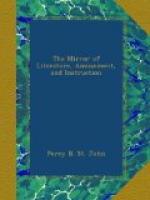I deposited my account of the play at the Morning Chronicle office in the afternoon, and went to see Miss Stephens as Polly. Those were happy times, in which she first came out in this character, in Mandane, where she sang the delicious air, “If o’er the cruel tyrant Love,” (so as it can never be sung again,) in Love in a Village, where the scene opened with her and Miss Matthews in a painted garden of roses and honeysuckles, and “Hope thou nurse of young Desire,” thrilled from two sweet voices in turn. Oh! may my ears sometimes still drink the same sweet sounds, embalmed with the spirit of youth, of health, and joy, but in the thoughts of an instant, but in a dream of fancy, and I shall hardly need to complain! When I got back, after the play, Perry called out, with his cordial, grating voice, “Well, how did she do?” and on my speaking in high terms, answered, that “he had been to dine with his friend the duke, that some conversation had passed on the subject, he was afraid it was not the thing, it was not the true sostenuto style; but as I had written the article” (holding my peroration on the Beggar’s Opera carelessly in his hand) “it might pass!” I could perceive that the rogue licked his lips at it, and had already in imagination “bought golden opinions of all sorts of people” by this very criticism, and I had the satisfaction the next day to meet Miss Stephens coming out of the editor’s room, who had been to thank him for his very flattering account of her.
I was sent to see Kean the first night of his performance of Shylock, when there were about a hundred people in the pit, but from his masterly and spirited delivery of the first striking speech, “On such a day you called me dog,” &c. I perceived it was a hollow thing. So it was given out in the Chronicle, but Perry was continually at me as other people were at him, and was afraid it would not last. It was to no purpose I said it would last: yet I am in the right hitherto. It has been said, ridiculously, that Mr. Kean was written up in the Chronicle. I beg leave to state my opinion that no actor can be written up or down by a paper. An author may be puffed into notice,




